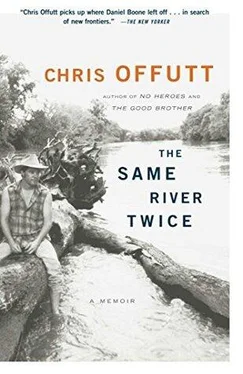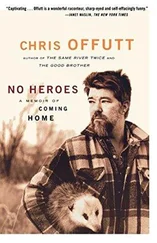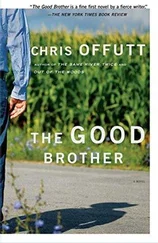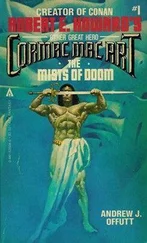Chris Offutt
The Same River Twice: A Memoir
I forget the names of towns without rivers.
A town needs a river to forgive the town.
Whatever river, whatever town—
It is much the same.
The cruel things I did, I took to the river.
I begged the current: make me better.
— Richard Hugo, “THE TOWNS WE KNOW AND LEAVE BEHIND, THE RIVERS WE CARRY WITH US”
The midwestern land has a softly undulating quality, like concentric circles spreading from a rock tossed into a farm pond. Before the giant plowing icebergs, water covered everything here. Often I see the bottom of an ancient ocean quite clearly — the ripples left by forgotten tides, the gentle upsweeps of a reef — and I imagine that the land is still under water. I possess gills in the woods and move against the resistance, exploring an abandoned sea.
Cloud shadows are great fish moving swiftly overhead. The prairie disappears into the glare of refracted sunlight fading with the depth, and becomes the living floorboards of an ocean. Jet contrails in the sky are a ship’s prow, cleaving the surface far away. Breath bubbles around my head as movement slows. Sound drifts into silence. I have slid out of my century and into an undersea past, alone with an uncaring force.
I am as alien here as in a city. I don’t belong, none of us does. Thumb and cranium lucked us into our current status and we’ve traded curiosity for erosion. Dinosaurs evolved until their bodies were too big for their brains and they could not command their limbs. The human mind has outstripped its body — we are as ungainly as the last great lizard.
The rivers of the nation are only water now, no longer rivers in any sense, trickles mostly, filled with poison. In ten million years a stranger will explore this former sea, this former iceberg, this former prairie, and sift through our remains. Instead of spear points and mastodon bones he will find bits of plastic, I should be a rock sculptor, carving a mighty pantheon to rival the debris we left on the moon. The ashes of Alexander’s library reveal the fragility of books.
My arrival in Iowa coincided with a two-year drought that left stunted corn drooping dead in the field. Brown grass crackled underfoot. The shadeless terrain reminded me of cheap plywood warped from too much time in weather. Temperatures at night surpassed a hundred. After my years of living in cities and mountains, the prairie offered me the unique ability to see trouble coming a long way off.
Rita and I rented a small house along the Iowa River. Due to zoning laws and the risk of flood, people owned their homes but not the land. Many of the houses were built on skids to be pulled by a bulldozer in case of eviction. Our dirt road ran parallel to the river past a wire fence thick with lopped-off catfish heads. Thirty acres of forest surrounded us. I took a long walk in the floodplain woods every day.
The locals accepted my presence; the state has long been known for tolerance. Public poker is legal at low stakes and motorcycle helmets are not required. Iowa is host to Amish and Mennonites, a large band of Maharishi folk, and the communal farms of the Amana colonies. Everyone has lived through drought, tornado, hail, blizzard, and fierce winds that scream across the prairie for hundreds of miles. There are two seasons — hot and cold. With any luck, autumn lasts a week; spring but a single afternoon.
There is no national park in Iowa, and if its state parks were stitched together, they’d occupy a space less than ten miles square. Ninety-five percent of the land is given over to agriculture, the highest of any state. Iowans wrestle, read, play miniature golf, and fly scale model aircraft — pastimes that require little ground space. Manned balloons drift every summer sky. Farmers have used the land so long that the richest soil in the nation is just old dirt, requiring a variety of chemicals that stay in the earth. Tap water cannot be trusted.
I was born and raised on a ridge in Eastern Kentucky, in the middle of the Daniel Boone National Forest. Trees grew close together, tangled with dense undergrowth. A greater variety of flora and fauna coexisted there than anywhere else in the country. I spent most of my childhood in those woods. Half of what I know, I learned there alone. At nineteen I left, vowing always to own my time. What began as an adherence to freedom became an inability to hold a job.
Five years ago, the night the Red Sox won the pennant, I’d asked Rita to marry me. We were drinking in a crowded Boston bar. She refused, and I was grateful, needing time to examine my shocking and spontaneous request. The second time was on a weekend trip to a cabin in upstate New York. We visited a lake where her family had vacationed when she was a girl. Surrounded by the roar of a waterfall, I asked her again, and she said no. This bothered me since I’d thought about it and I was sober.
“No, you’re not,” she said. “You’re drunk on nature.”
Being refused twice led me to a careful strategy, guaranteed to catch her when she was weak. On the morning of her birthday, I hurried to the bathroom ahead of her. A few minutes later she stumbled into my trap. We were both nude. I eased my knees to the cold tile. “Happy birthday,” I said. “Will you marry me?” Bleary-eyed and half asleep, she said yes, and stepped past me to the toilet.
We were wed in Manhattan, Rita’s hometown, at the Municipal Building on Chambers Street. The facility was undergoing renovation and the actual chapel was closed. We used an auxiliary room that contained a scaffolding, tools, and a dropcloth. Ahead of us in line was an Asian couple; just behind us, a Hispanic couple. We all served as one another’s witnesses, though none of us spoke a common tongue. Our ceremony lasted two minutes, long enough for the justice of the peace to drop one of the mismatched rings I’d bought in a Hell’s Kitchen pawnshop. His clumsiness was understandable since I’d sprinkled a handful of soil on the floor. It was from my family home and I wanted to stand on it for the ceremony.
We moved to Kentucky shortly thereafter, and to Iowa a year later. The subject of children became a frequent though vague topic between us. Rita worked as a psychologist, providing care for the homeless and mentally ill. I was trying to be a writer — with her financial support. This meant abandoning twelve years of diligent journal entries for what I considered “real writing.” A child struck me as the one ingredient that would ruin my hopes, forcing me into full-time employment. I told her this was the wrong time. She pointed out that there was no right time.
“Besides,” she said, “I’m thirty-four.”
I’d always wanted kids, but figured it wouldn’t be fair to them since I could barely support myself. On the other hand, I was thirty-three years old, the age when Jesus died, when Alexander had conquered the known world. My youth was behind me, not misspent exactly, but squandered to a certain extent. While the rest of my generation had been lodging themselves into careers, I’d pretty much run amok.
Rita was smart enough not to push the idea of a child. It was always there, though, shimmering between us, sometimes off to the side, intangible but strong. I’d catch her looking at a woman pushing a baby carriage, and feel a vague guilt, as if I were denying her. I studied fathers in town with their kids, trying to imagine myself in their position. The men seemed out of sorts, like tourists in a strange port, self-conscious of their foreign clothes. Invariably there passed between father and child a private moment that filled me with awe.
Читать дальше












